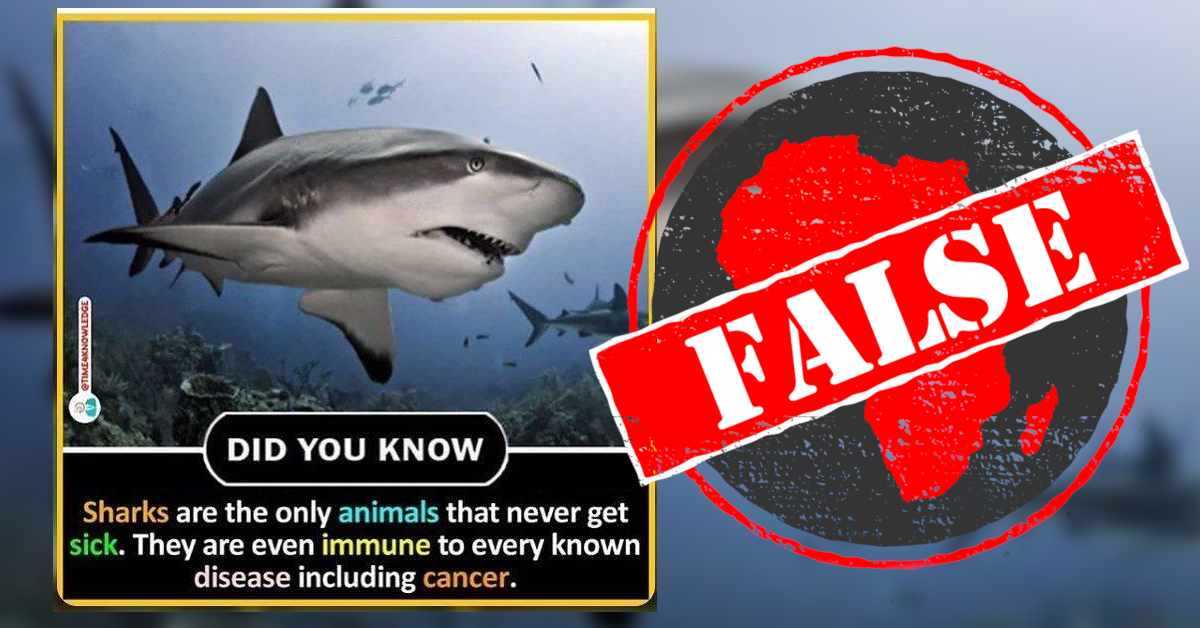A photo of a shark is prominently featured in a meme currently shared on Facebook in Nigeria.
The meme claims that sharks “are the only animals to never get sick. They are even immune to every known disease including cancer”.
This post was flagged as part of Facebook’s efforts to combat false news and misinformation on its News Feed. (Read more about Africa Check’s partnership with Facebook.)
Is it true that sharks never get ill?

In 1992 the book Sharks Don’t Get Cancer: How Shark Cartilage Could Save Your Life, by William Lane and Linda Comac, was published. But despite its title, the book did not claim that sharks never get cancer.
The authors argued that the rare occurrence of solid tumours in sharks was because of cancer-fighting elements in their cartilage.
Other researchers have pointed out that sharks’ cartilage can stop blood vessels from growing within tumours. The development of blood vessels is crucial for cancerous tumours to grow.
Emma Williams, a marine biologist at the South African Sharklife Conservation Group, told Africa Check: “The myth that sharks don’t get cancer and therefore their cartilage can be used as a cancer cure has been scientifically and medically disproved.”
Williams said: “As incredible as sharks are, they are not immune to illness. Just like every other animal they are still susceptible to parasites, diseases and disabilities, including cancer.”
The American Museum of Natural History discussed six myths about sharks in an article published in 2001. One of these is the persistent myth that sharks don’t get cancer.
According to the AMNH sharks do get cancerous tumours, even if the properties of shark cartilage makes cancer less likely than in other animals.
The authors of a 2004 review titled Shark Cartilage, Cancer and the Growing Threat of Pseudoscience, published in the scientific journal Cancer Research, also concluded that sharks get cancer. – Eileen Jahn
The meme claims that sharks “are the only animals to never get sick. They are even immune to every known disease including cancer”.
This post was flagged as part of Facebook’s efforts to combat false news and misinformation on its News Feed. (Read more about Africa Check’s partnership with Facebook.)
Is it true that sharks never get ill?

Rumours about shark cartilage
In 1992 the book Sharks Don’t Get Cancer: How Shark Cartilage Could Save Your Life, by William Lane and Linda Comac, was published. But despite its title, the book did not claim that sharks never get cancer.
The authors argued that the rare occurrence of solid tumours in sharks was because of cancer-fighting elements in their cartilage.
Other researchers have pointed out that sharks’ cartilage can stop blood vessels from growing within tumours. The development of blood vessels is crucial for cancerous tumours to grow.
Emma Williams, a marine biologist at the South African Sharklife Conservation Group, told Africa Check: “The myth that sharks don’t get cancer and therefore their cartilage can be used as a cancer cure has been scientifically and medically disproved.”
Williams said: “As incredible as sharks are, they are not immune to illness. Just like every other animal they are still susceptible to parasites, diseases and disabilities, including cancer.”
Sharks and diseases
The American Museum of Natural History discussed six myths about sharks in an article published in 2001. One of these is the persistent myth that sharks don’t get cancer.
According to the AMNH sharks do get cancerous tumours, even if the properties of shark cartilage makes cancer less likely than in other animals.
The authors of a 2004 review titled Shark Cartilage, Cancer and the Growing Threat of Pseudoscience, published in the scientific journal Cancer Research, also concluded that sharks get cancer. – Eileen Jahn
Republish our content for free
For publishers: what to do if your post is rated false
A fact-checker has rated your Facebook or Instagram post as “false”, “altered”, “partly false” or “missing context”. This could have serious consequences. What do you do?
Click on our guide for the steps you should follow.
Publishers guideAfrica Check teams up with Facebook
Africa Check is a partner in Meta's third-party fact-checking programme to help stop the spread of false information on social media.
The content we rate as “false” will be downgraded on Facebook and Instagram. This means fewer people will see it.
You can also help identify false information on Facebook. This guide explains how.


Add new comment